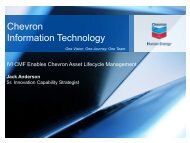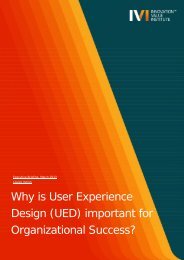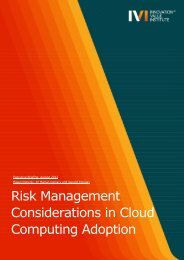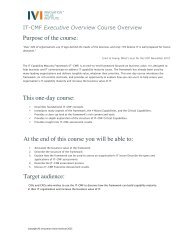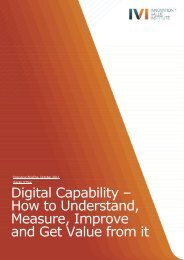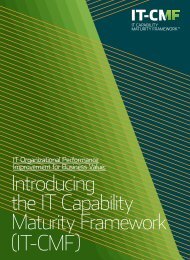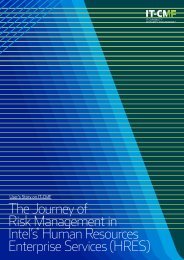IVI - Innovation Value Institute - National University of Ireland ...
IVI - Innovation Value Institute - National University of Ireland ...
IVI - Innovation Value Institute - National University of Ireland ...
You also want an ePaper? Increase the reach of your titles
YUMPU automatically turns print PDFs into web optimized ePapers that Google loves.
A growing trend, especially in functions like IT, is to<br />
develop staff in lower cost, <strong>of</strong>fshore geographies.<br />
Until you can build a critical mass in the <strong>of</strong>fshore<br />
location, time zones and distance makes training<br />
and development a significant challenge. We<br />
have created an efficient and effective knowledge<br />
transfer process that is also useful in normal job<br />
transitions. It includes skills pr<strong>of</strong>iling and workflow<br />
analysis that is used to create mentoring plans that<br />
deliver measurable results. Following this training,<br />
job shadowing and certification verify successful<br />
knowledge transfer. This process is typically<br />
used with college hires to enable them to deliver<br />
competent work results in just a few months.<br />
What do you do if your expert on fuel product<br />
quality with 20 years <strong>of</strong> experience, tells you he<br />
plans to retire in two months and you realise<br />
that nobody else is ready to take over? In six<br />
weeks we were able to elicit a step-by-step<br />
process and identify the key elements <strong>of</strong> this<br />
expert’s ‘mental model’ that made his thinking<br />
clear in each step [10]. The successor, a recently<br />
graduated chemist hired several months after<br />
the expert left, found the explicit knowledge<br />
absolutely invaluable. He was able to perform<br />
competently after just a few months on the job.<br />
Results like these are what you should expect<br />
after you have added tools from the knowledge<br />
transfer playbook to your repertoire. Some<br />
processes such as Community <strong>of</strong> Practice or<br />
Q&A are relatively easy to implement. However,<br />
other processes such as Knowledge Elicitation<br />
require more skill and experience. With a good<br />
teacher, you can learn to sucessfully deploy<br />
all such processes in your company.<br />
Getting Started<br />
The playbook is part <strong>of</strong> a practical, proven,<br />
knowledge transfer process developed and<br />
deployed successfully in a large corporation.<br />
The system is designed to be integrated into<br />
the existing operations <strong>of</strong> any company in<br />
order to deliver a range <strong>of</strong> measurable benefits.<br />
Successful deployment requires a Knowledge<br />
Transfer team that consists <strong>of</strong> business managers,<br />
HR or Learning and Development (L&D)<br />
staff, KM practitioners, and IT. This team can<br />
provide the necessary expertise, influence and<br />
accountability. Each group provides key elements.<br />
Business managers establish the need for<br />
knowledge transfer. They are accountable for<br />
the performance planning and management, the<br />
staff development, the work assignments, and<br />
the business continuity needed to achieve their<br />
goals and metrics. Business managers are also<br />
directly responsible for delivering the rewards<br />
and recognition that shapes desired behaviour.<br />
A corporate HR or L&D group is responsible<br />
for the processes associated with workforce<br />
planning and staffing, performance management,<br />
learning, competency assessment, succession<br />
planning, and retention. Since most companies<br />
run these processes annually, HR staff will have<br />
frequent conversations with business leaders<br />
to identify knowledge transfer opportunities<br />
for both leadership development and individual<br />
contributor performance improvement.<br />
While HR creates the agenda for these various<br />
people processes, they usually have insufficient<br />
familiarity with the knowledge transfer<br />
processes to make effective recommendations<br />
and action plans. The KM group ensures that<br />
those processes in Table 1 most relevant to their<br />
company’s needs are deployed and supported<br />
with training and facilitation. The KM team also<br />
participates with HR and business managers<br />
in order to select the most appropriate transfer<br />
methods to meet the specific knowledge goals,<br />
and to recommend behaviours that reinforce<br />
knowledge transfer. If your company does not<br />
have a KM group, HR or L&D is a natural place<br />
to support the Knowledge Transfer capabilities.<br />
06/07<br />
A number <strong>of</strong> the Knowledge Transfer methods<br />
detailed in Table 1 are enabled by collaboration and<br />
document management tools that are supported<br />
by IT. Examples include Community <strong>of</strong> Practice<br />
and Q&A that use knowledge repositories, Wikis<br />
or SharePoint sites to store the documented<br />
processes, tools and templates. The KM team<br />
works closely with IT to determine system<br />
business requirements; and it works closely<br />
with business representatives to configure the<br />
IT applications for the most effective storage<br />
and retrieval <strong>of</strong> knowledge and for connection<br />
to colleagues who can help solve problems.<br />
Once the knowledge transfer processes are in<br />
place, the Knowledge Transfer team can facilitate<br />
conversations with business managers in order<br />
to identify critical competencies or roles and the<br />
expertise needed to meet business goals. They<br />
can look at staffing in order to identify who has<br />
the knowledge now, who needs it in future, and<br />
when. For each Knowledge Transfer opportunity,<br />
the KM group helps to select the most appropriate<br />
methods, helps to develop SME and learner action<br />
plans, and provides facilitation support as needed.<br />
A Sustainable Change in<br />
Workforce Performance<br />
An effective knowledge and know-how transfer<br />
system should not be considered a one-time<br />
reaction to the impending boomer situation;<br />
the need is universal and never-ending. The<br />
strategy and playbook presented in this white<br />
paper provides managers with proven ways<br />
to achieve significant, sustainable value by<br />
accelerating competency, raising performance, and<br />
maintaining business continuity. Implementation<br />
by a multi-disciplinary Knowledge Transfer team<br />
will provide the right mix <strong>of</strong> processes, tools<br />
and skills to incorporate knowledge transfer into<br />
your existing operations. The business benefits<br />
will align with your company’s business strategy<br />
and metrics, and the resulting knowledgesharing<br />
behaviours will help your company<br />
remain competitive in the years ahead.



